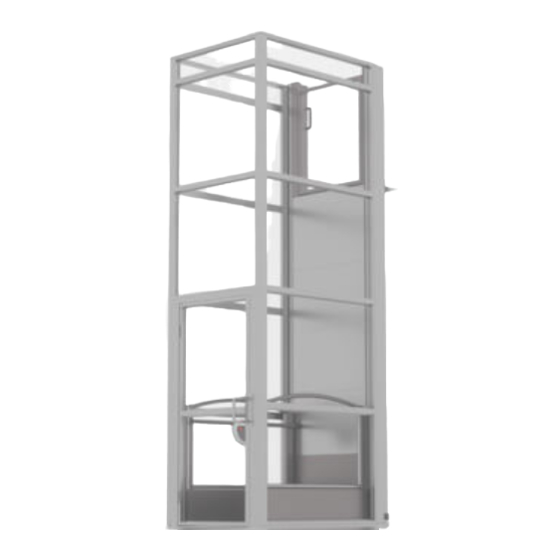
Table of Contents
Troubleshooting

Summarization of Contents
General Information
1.1 Product information
Details operational and physical ratings, materials, and electrical specifications of the lift.
1.2 Definitions
Provides definitions for key terms used in the manual, explaining components and functions of the lift system.
1.3 Important safety information
Outlines essential safety precautions to be observed when operating and using the wheelchair lift.
Lift Operation Procedures
2.1 Description of operation
Explains how the lift functions, including controls, hydraulic system, and battery backup.
2.2 Standard operation
Details the step-by-step process for normal operation of the lift, including door locking and switch usage.
2.3 Manual lowering
Provides instructions for manually lowering the platform in case of power failure or emergency.
2.4 Manually unlocking doors
Explains how to manually override door interlocks for access, referencing another section.
2.5 Using the service override controls
Describes the use of service override controls for maintenance, emphasizing extreme caution.
Maintenance and Basic Troubleshooting
3.1 Routine maintenance
Outlines the required maintenance checks to be performed every six months for proper lift function.
3.2 Basic troubleshooting
Lists common issues and checks to perform before contacting a service technician for operational problems.
Advanced Troubleshooting Guide
4.1 Advanced troubleshooting
Details complex troubleshooting steps for licensed technicians, mapping problems to remedies and pages.
Mechanical Repair and Disassembly
5.1 Safety procedures
Covers essential safety protocols for repairs, including electrical and hydraulic isolation.
5.2 Removing the fascia panels
Instructions for removing bottom fascia panels to access internal components.
5.3 Removing the upper covers (16E, 16S)
Procedure for removing upper covers to access specific switches and interlocks.
5.4 Mechanically blocking the platform
Guidance on safely blocking the platform for service to prevent crushing hazards.
5.5 Hydraulic drive system
Describes the hydraulic system, including its power unit, cylinders, valves, and stop collar adjustment.
5.6 Platform safeties
Explains the mechanical safety devices designed to prevent platform falls in case of lifting chain failure.
5.7 Slack chain switches
Details the function and adjustment of slack chain switches for monitoring chain tension.
5.8 Lower terminal switch
Explains the function and adjustment of the lower terminal switch for platform stopping and door unlocking.
5.9 Upper terminal switch and creep switch
Details the upper terminal and creep switches for platform stopping, door unlocking, and leveling.
5.10 Door lock switches
Describes door interlock switches and methods for mechanically overriding door locks for access.
5.11 Traveling cable
Describes the traveling cable connecting platform devices to the control equipment and its routing.
5.12 Platform operating station
Details the components of the platform operating station, including controls and emergency stop.
5.13 Windows
Covers removal and reinstallation of door, runway enclosure, and platform windows.
5.14 Disassembling and detaching the platform
Provides steps to disassemble and detach the platform, including interior covers and side assemblies.
5.15 Runway enclosure (16E, 16D)
Describes the runway enclosure components and fastening, noting disassembly is usually not required.
Electrical Testing and Adjustments
6.1 Access to the lift controller
Explains how to access the lift controller by removing fascia and electrical box covers.
6.2 Controller diagnostic lights
Illustrates and describes diagnostic LED lights on the controller board for troubleshooting purposes.
6.2.1 Input, output and controller status lights
Details the meaning of illuminated status lights on the controller board for diagnostics and operation.
6.2.2 Safety series
Explains the safety series lights indicating safety switch status required for lift operation.
6.3 Removing the controller subpanel
Provides steps for removing the controller subpanel to access internal electrical components.
6.4 Testing the switches
References other sections for switch testing, directing users to diagnostic lights for troubleshooting.
6.5 Testing supply of power to lift and motor
Explains how the power supply converts AC to DC for the lift and motor, and the role of batteries.
6.6 Testing the power supply
Details how to test the 27VDC power supply using LEDs or a voltmeter.
6.7 Testing the batteries
Explains how to test the 12VDC batteries for voltage and proper charging.
6.8 Testing the controller fuse
Provides instructions for testing and replacing the 4A controller fuse.
6.9 Testing the motor fuse
Details the procedure for testing and replacing the 80A motor fuse with safety precautions.
6.10 Testing the SSR (motor relay)
Explains how to test the Solid State Relay (SSR) for the motor using specific equipment.
6.11 Adjusting alarm volume
Describes how to adjust the audible alarm volume using the rotary cover over the speakers.
6.12 Two-way communication system
Mentions the optional communication system and refers to its separate manual for settings.
6.13 Adjusting the illumination
Details how to adjust platform illumination brightness and mode using trim pots and DIP switches.
6.14 Adjusting/testing the optional power door operators
Explains the adjustment and testing of optional power door operators, referencing manufacturer instructions.
6.15 Electrical diagram
Refers to a color electrical diagram provided separately in the document box for system understanding.
Inspections and Safety Testing
7.1 System specifications
Lists key technical specifications of the lift system, including drive, pressure, and chain details.
7.2 Test platform safeties
Outlines recommended materials and the test procedure for ensuring platform safeties are functional.





Need help?
Do you have a question about the 16E and is the answer not in the manual?
Questions and answers